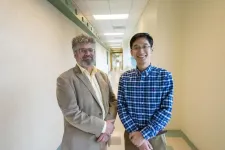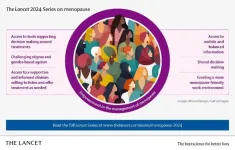(Press-News.org) CLEVELAND – New Cleveland Clinic-led research points to sildenafil (Viagra) as a potential treatment for Alzheimer’s disease. The study provides evidence from computational models, insurance claims data and observations from brain cells in Alzheimer’s patients.
Sildenafil is the main component of drugs used to treat erectile dysfunction (Viagra) and pulmonary arterial hypertension (Revatio).
“Our findings provide further weight to re-purposing this existing FDA-approved drug as a novel treatment for Alzheimer’s, which is in great need of new therapies,” said Feixiong Cheng, Ph.D., who led the research. “We used artificial intelligence to integrate data across multiple domains which all indicated sildenafil’s potential against this devastating neurological disease.”
Alzheimer’s disease currently affects over 6 million Americans and incidence is expected to triple by 2050, underscoring the need for rapid development of new prevention and treatment strategies. Drug repurposing – use of an existing drug for new therapeutic purposes – offers a practical alternative to the costly and time-consuming traditional drug discovery process.
Published in Journal of Alzheimer’s Disease, the study builds upon the researchers’ earlier findings in 2021 that used computational models to initially identify sildenafil as a promising drug candidate to help prevent and treat Alzheimer’s disease.
In the new study, Dr. Cheng, director of the Cleveland Clinic Genome Center, and his team analyzed millions of de-identified insurance claims from two independent patient databases, which revealed a 30-54% reduced prevalence in Alzheimer’s disease diagnoses among patients who took sildenafil compared to those who did not after adjusting various possible confounding factors.
In brain cells from Alzheimer’s patients, researchers also showed that sildenafil lowers levels of neurotoxic tau proteins, which are known to be associated with Alzheimer’s disease when they build up. They also found that neurons treated with sildenafil expressed genes related to cell growth, improved brain function, reduced inflammation and other processes known to protect against the neural degeneration associated with Alzheimer’s disease.
Dr. Cheng’s findings demonstrate the feasibility of using computer models to identify potential new drug candidates in a fast, reliable way, representing a significant step forward in Alzheimer’s drug discovery.
“After integrating this large amount of data computationally, it is rewarding to see sildenafil’s effects in human neurons and real-world patient outcomes,” said Dr. Cheng. “We believe our findings provide the evidence needed for clinical trials to further examine the potential effectiveness of sildenafil in patients with Alzheimer’s disease.”
Dr. Cheng’s co-authors include Andrew A. Pieper, M.D., Ph.D., of Louis Stokes Cleveland VA Medical Center, Case Western Reserve University and University Hospitals Cleveland Medical Center; and Jeffrey Cummings, M.D., Sc.D., director emeritus of the Cleveland Clinic Lou Ruvo Center for Brain Health in Las Vegas.
Dhruv Gohel, Ph.D., and Amit Gupta, Ph.D., postdoctoral research associates in Dr. Cheng’s laboratory, are co-first authors. The study was primarily supported by the National Institute on Aging of the National Institutes of Health (NIH) under award numbers R01AG066707, U01AG073323, R01AG076448, R01AG082118, RF1AG082211, R01AG084250, R56AG074001, andR21AG083003, and the National Institute of Neurological Disorders and Stroke of NIH under award number RF1NS133812.
CLEVELAND – New Cleveland Clinic-led research points to sildenafil (Viagra) as a potential treatment for Alzheimer’s disease. The study provides evidence from computational models, insurance claims data and observations from brain cells in Alzheimer’s patients.
Sildenafil is the main component of drugs used to treat erectile dysfunction (Viagra) and pulmonary arterial hypertension (Revatio).
“Our findings provide further weight to re-purposing this existing FDA-approved drug as a novel treatment for Alzheimer’s, which is in great need of new therapies,” said Feixiong Cheng, Ph.D., who led the research. “We used artificial intelligence to integrate data across multiple domains which all indicated sildenafil’s potential against this devastating neurological disease.”
Alzheimer’s disease currently affects over 6 million Americans and incidence is expected to triple by 2050, underscoring the need for rapid development of new prevention and treatment strategies. Drug repurposing – use of an existing drug for new therapeutic purposes – offers a practical alternative to the costly and time-consuming traditional drug discovery process.
Published in Journal of Alzheimer’s Disease, the study builds upon the researchers’ earlier findings in 2021 that used computational models to initially identify sildenafil as a promising drug candidate to help prevent and treat Alzheimer’s disease.
In the new study, Dr. Cheng, director of the Cleveland Clinic Genome Center, and his team analyzed millions of de-identified insurance claims from two independent patient databases, which revealed a 30-54% reduced prevalence in Alzheimer’s disease diagnoses among patients who took sildenafil compared to those who did not after adjusting various possible confounding factors.
In brain cells from Alzheimer’s patients, researchers also showed that sildenafil lowers levels of neurotoxic tau proteins, which are known to be associated with Alzheimer’s disease when they build up. They also found that neurons treated with sildenafil expressed genes related to cell growth, improved brain function, reduced inflammation and other processes known to protect against the neural degeneration associated with Alzheimer’s disease.
Dr. Cheng’s findings demonstrate the feasibility of using computer models to identify potential new drug candidates in a fast, reliable way, representing a significant step forward in Alzheimer’s drug discovery.
“After integrating this large amount of data computationally, it is rewarding to see sildenafil’s effects in human neurons and real-world patient outcomes,” said Dr. Cheng. “We believe our findings provide the evidence needed for clinical trials to further examine the potential effectiveness of sildenafil in patients with Alzheimer’s disease.”
Dr. Cheng’s co-authors include Andrew A. Pieper, M.D., Ph.D., of Louis Stokes Cleveland VA Medical Center, Case Western Reserve University and University Hospitals Cleveland Medical Center; and Jeffrey Cummings, M.D., Sc.D., director emeritus of the Cleveland Clinic Lou Ruvo Center for Brain Health in Las Vegas.
Dhruv Gohel, Ph.D., and Amit Gupta, Ph.D., postdoctoral research associates in Dr. Cheng’s laboratory, are co-first authors. The study was primarily supported by the National Institute on Aging of the National Institutes of Health (NIH) under award numbers R01AG066707, U01AG073323, R01AG076448, R01AG082118, RF1AG082211, R01AG084250, R56AG074001, andR21AG083003, and the National Institute of Neurological Disorders and Stroke of NIH under award number RF1NS133812.
END
Cleveland Clinic-led research supports repurposing sildenafil (Viagra) for Alzheimer’s treatment
Large-scale study provides evidence that FDA-approved drug can help protect brain cells from Alzheimer’s disease
2024-03-05
ELSE PRESS RELEASES FROM THIS DATE:
Antarctic researchers hitched a lift on a cruise ship, and recommend this eco-friendly, collaborative approach to remote ocean science
2024-03-05
Antarctic researchers hitched a lift on a cruise ship, and recommend this eco-friendly, collaborative approach to remote ocean science.
####
Article URL: https://journals.plos.org/climate/article?id=10.1371/journal.pclm.0000348
Article Title: New methods of undertaking marine science in Antarctica using tourism vessels
Contact: Matthew Mulrennan; matt@kolossal.org
Author Countries: Canada, United States
Funding: The authors received no specific funding for this work. END ...
Odysseus has a new home and brings the Earthling Project along for the ride
2024-03-05
March 5, 2024, Mountain View, CA – The moon lander Odysseus, known as Odie, touched down on the Moon's surface on February 22, becoming the first time the U.S. has landed on the Moon in more than 50 years and the first commercial moon lander to successfully land on the Moon. Along with its science payload, the spacecraft also brought along a fusion of art and space exploration, SETI Institute's Artist in Residence (SETI AIR), Felipe Pérez Santiago's Earthling Project, a collection of global musical compositions representing Earth's cultural ...
Painting a molecular portrait of the brain with mass spectrometry and deep learning
2024-03-05
Beckman Institute for Advanced Science and Technology researchers Jonathan Sweedler, a professor of chemistry, and Fan Lam, a professor of bioengineering, outlined how spatial omics technologies can reveal the molecular intricacy of the brain at different scales.
Their research appeared this month in Nature Methods.
The researchers and their colleagues used a biochemical imaging framework integrated with deep learning to create 3D molecular maps with cell specificity to better understand how the brain functions in health and disease. Their research is supported by a $3 million grant from ...
Semaglutide reduces severity of common liver disease in people with HIV
2024-03-05
WHAT:
A weekly injection of semaglutide was safe and reduced the amount of fat in the liver by 31% in people with HIV and metabolic dysfunction-associated steatotic liver disease (MASLD), according to a presentation today at the 2024 Conference on Retroviruses and Opportunistic Infections (CROI) in Denver. This is the first clinical trial of semaglutide for MASLD in people with HIV. The research was sponsored by the National Institute of Allergy and Infectious Diseases (NIAID), part of the National Institutes of Health, and conducted in the United States and Brazil by ACTG, a global clinical trials network focused on HIV and other infectious diseases. ...
The Lancet: Experts warn about the overmedicalisation of menopause and call for a new approach to how society views menopause and supports women as they age
2024-03-05
The Lancet: Experts warn about the overmedicalisation of menopause and call for a new approach to how society views menopause and supports women as they age
Menopause is a life stage for half the world’s population and is generally depicted in a negative way. However, women’s experiences of menopause are unique and vary hugely.
The Lancet 2024 Series on menopause argues that an over-simplified narrative of menopause as a health problem to be solved by replacing hormones is not based on evidence and deflects attention from the need for substantial societal shifts in how menopause, and midlife/older women in general, are viewed and treated around the world.
The ...
Researchers show that menopause does not always impact mental health
2024-03-05
A new review paper from authors at Brigham and Women’s Hospital and collaborators concludes that menopause does not uniformly elevate the risk of depression and other mental health conditions.
Menopause has long been thought to cause psychological distress, but a new review suggests that this is not always the case. The review, written by experts from Brigham Women’s Hospital, a founding member of the Mass General Brigham healthcare system, and international collaborators, is the third in a series of menopause-themed papers published in The ...
Evolving hydrogen-storage technology: guidelines developed for the design of anti-evaporation catalysts
2024-03-05
1. A research team consisting of NIMS and the Tokyo Institute of Technology has identified materials capable of catalyzing the conversion of ortho-hydrogen to para-hydrogen. These catalysts should be essential to the spread of mass-transportation/storage of liquid hydrogen.
2. Hydrogen is becoming widely accepted as an alternative energy source to fossil fuels. Its liquefaction (at temperatures below -253°C under pressures higher than one atmosphere) can dramatically reduce its volume, making it suitable for transportation and storage. Hydrogen molecules (H2)—each composed of two hydrogen atoms—exist in two isomeric forms: ortho- and para-H2. Under normal conditions, ...
Early retirement impacts mental health of blue-collar women more than white-collar peers
2024-03-05
Retirement is a major transition that can have a significant impact on a person’s life.
For some, retirement evokes thoughts of slowing down, relaxing, and enjoying more of what life has to offer. For others, ending a regular work schedule can create stress and uncertainties about being able to pay necessary bills and maintain adequate medical care.
A new study by researchers at the Yale School of Public Health examines how retirement affects mental health and related inpatient mental health care among female workers in China, ...
A smart molecule beats the mutation behind most pancreatic cancer
2024-03-05
FOR IMMEDIATE RELEASE
Media Contact: LEVI GADYE (628) 399-1046
Levi.Gadye@ucsf.edu
Subscribe to UCSF News
A Smart Molecule Beats the Mutation Behind Most Pancreatic Cancer
Scientists discover a new way to disarm a deadly protein that also appears in cancers of the lung, breast and colon.
UC San Francisco researchers have designed a candidate drug that could help make pancreatic cancer, which is almost always fatal, a treatable, perhaps even curable, condition.
The new molecule permanently modifies a wily cancer-causing ...
Using light to precisely control single-molecule devices
2024-03-05
In a new Nature Communications study, Columbia Engineering researchers report that they have built highly conductive, tunable single-molecule devices in which the molecule is attached to leads by using direct metal-metal contacts. Their novel approach uses light to control the electronic properties of the devices and opens the door to broader use of metal-metal contacts that could facilitate electron transport across the single-molecule device.
The challenge
As devices continue to shrink, their electronic ...
LAST 30 PRESS RELEASES:
A biological material that becomes stronger when wet could replace plastics
Glacial feast: Seals caught closer to glaciers had fuller stomachs
Get the picture? High-tech, low-cost lens focuses on global consumer markets
Antimicrobial resistance in foodborne bacteria remains a public health concern in Europe
Safer batteries for storing energy at massive scale
How can you rescue a “kidnapped” robot? A new AI system helps the robot regain its sense of location in dynamic, ever-changing environments
Brainwaves of mothers and children synchronize when playing together – even in an acquired language
A holiday to better recovery
Cal Poly’s fifth Climate Solutions Now conference to take place Feb. 23-27
Mask-wearing during COVID-19 linked to reduced air pollution–triggered heart attack risk in Japan
Achieving cross-coupling reactions of fatty amide reduction radicals via iridium-photorelay catalysis and other strategies
Shorter may be sweeter: Study finds 15-second health ads can curb junk food cravings
Family relationships identified in Stone Age graves on Gotland
Effectiveness of exercise to ease osteoarthritis symptoms likely minimal and transient
Cost of copper must rise double to meet basic copper needs
A gel for wounds that won’t heal
Iron, carbon, and the art of toxic cleanup
Organic soil amendments work together to help sandy soils hold water longer, study finds
Hidden carbon in mangrove soils may play a larger role in climate regulation than previously thought
Weight-loss wonder pills prompt scrutiny of key ingredient
Nonprofit leader Diane Dodge to receive 2026 Penn Nursing Renfield Foundation Award for Global Women’s Health
Maternal smoking during pregnancy may be linked to higher blood pressure in children, NIH study finds
New Lund model aims to shorten the path to life-saving cell and gene therapies
Researchers create ultra-stretchable, liquid-repellent materials via laser ablation
Combining AI with OCT shows potential for detecting lipid-rich plaques in coronary arteries
SeaCast revolutionizes Mediterranean Sea forecasting with AI-powered speed and accuracy
JMIR Publications’ JMIR Bioinformatics and Biotechnology invites submissions on Bridging Data, AI, and Innovation to Transform Health
Honey bees navigate more precisely than previously thought
Air pollution may directly contribute to Alzheimer’s disease
Study finds early imaging after pediatric UTIs may do more harm than good
[Press-News.org] Cleveland Clinic-led research supports repurposing sildenafil (Viagra) for Alzheimer’s treatmentLarge-scale study provides evidence that FDA-approved drug can help protect brain cells from Alzheimer’s disease







